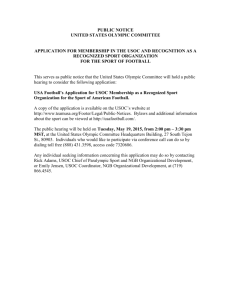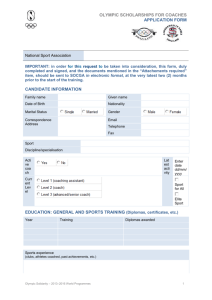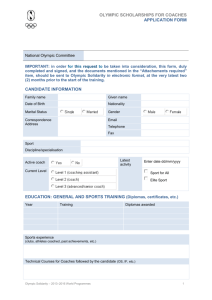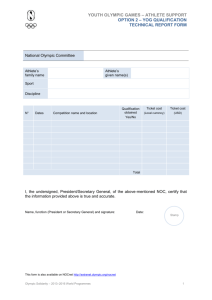2 0 1 6 – 2 0 1 7 9 EDITION TH
advertisement
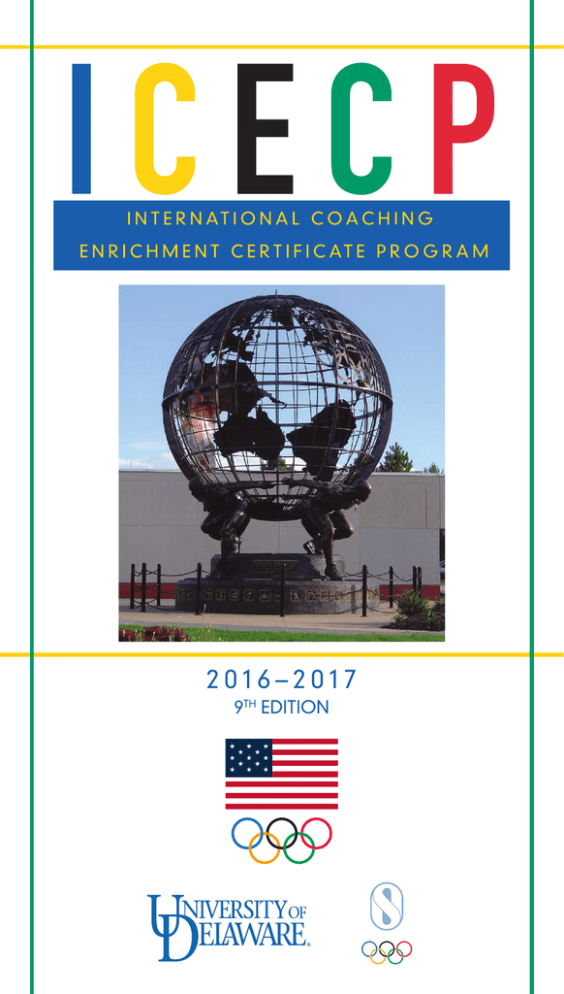
2016–2017 9TH EDITION the international coaching enrichment certificate program (icecp) has been received with much enthusiasm amongst NOCs and more than 200 participating coaches representing 102 countries from all five continents and 23 sports. Celebrating the success of the past editions of the ICECP, we are looking forward to launching the ninth edition in partnership with Olympic Solidarity and the University of Delaware. While the United States has a long history of serving and supporting the Olympic Lawrence F. Probst Movement, we have made a renewed commitment to sharing our resources, expanding our international partnerships and extending a welcoming hand to the world. We are honored to be able to be involved with a program that contributes to the Olympic Movement’s greatest asset—its human capital. Through the ICECP program we are not only training coaches, but we are touching individuals and supporting their human development as well as developing friendships world-wide. With 85 nations having won a medal in London, this shared international partnership is one of the Olympic Movement’s greatest strengths. Partnering with Olympic Solidarity gives us the opportunity to provide coaches with world class training opportunities to improve their knowledge and expertise. This is of particular importance given the demands placed on coaches today. Coaches are expected to be able to stay abreast of the latest technical methods of their sport, as well as incorporate within the training of their athletes the use physiology, nutrition, psychology, strength and conditioning, video technology (among others). The value of a coach educated in sport science, ethics and technical knowledge for their sport is of the greatest value to the development of athletes. The ICECP will provide national level coaches the ability to keep abreast of the latest coaching principles from national level professionals from the University of Delaware, and from USOC coaching and performance experts. In fact, those interested in becoming familiarized with the latest information in the area of Olympic coaching education in the United States are invited to view the Olympic Coach magazines on the following link on our website: http://www.teamusa.org/About-the-USOC/Athlete-Development/Coaching-Education/ Coach-E-Magazine On behalf of the U.S. Olympic Committee, we look forward to welcoming coaches from around the world to the University of Delaware, a top tier American university with a rich international academic and athletic tradition, and to our very own U.S. Olympic Training Center and headquarters in Colorado Springs. Lawrence F. Probst President U.S. Olympic Committee the university of delaware is proud and excited to partner again with the United States Olympic Committee and Olympic Solidarity to offer coaches from around the world the opportunity to participate in the ninth International Coaching Enrichment Certificate Program (ICECP). The University supports the high ideals of the Olympic Movement and is pleased to offer a well-structured, comprehensive and in-depth course of study. Nancy Targett UD is a leader in promoting international cooperation and has a long and proud tradition in intercollegiate athletics and in training elite athletes for international competition. The beautiful UD campus is home to world-class sport competition and training facilities as well as modern classrooms and library. Our faculty in the areas of sport medicine, strength and conditioning and sport management are outstanding scholars and teachers and our sport coaches and administrators are considered some of the best in their respective sports in the United States. We all look forward to sharing our knowledge with the participating coaches and learning from them as well, and we hope that they will use the experience and knowledge gained through ICECP to grow sport and further the Olympic ideals in their own countries. Nancy Targett Acting President University of Delaware 2 www.udel.edu/ICECP Mission the mission of the international coaching enrichment certificate program is to provide national level coaches and those responsible for the development of the sport national coaching structures in their countries with a practical program orientated towards developing proficiency in the areas of sport sciences, talent identification, athlete development, coaching education, coaching management, grass roots sport development and ethical aspects of coaching at all levels of competition and across multiple sports. The focus of the program includes training participants to identify and develop athletes, but also provides the participants with the skills and competencies needed to educate aspiring coaches in their home country. The program will lay theoretical foundations and offer practical applications for the further growth of sport and the Olympic ideals within their home country. The intended outcome is for ICECP participants to return to their countries and to serve as coaches within their respective sports as well as become foundation builders for future coaches and athletes while spreading the Olympic spirit. www.udel.edu/ICECP 3 Program Structure the international coaching enrichment certificate program is an intensive coaches’ education pro- gram offering lectures, projects, guest speakers, participant presentations, group work, field trips, and project planning and implementation. The program will consist of four modules scheduled over an academic year, during which time the candidate will work with an international tutor to develop a personal project that will be implemented for the benefit of the respective sport or sport in general in his or her country. The ICECP is open to coaches from all sports; however, preference will be given to coaches in the following sports: canoe/kayak modern table tennis weightlifting athletics cycling pentathlon taekwondo wrestling basketball fencing rowing tennis boxing judo swimming volleyball (women) archery Pre-coursework: personal project: Candidates will submit a personal project that has been approved by their National Olympic Committee (NOC) leadership and respective National Federation as part of the application process. If accepted, the candidates will be provided with personal project guidelines. After consultation with their NOC, the candidates will submit a detailed project outline to the Director of the Program one month prior to the start of the program. A tutor will be assigned thereafter to each participant to mentor him or her on the development of their project. past topics have included: • Basketball coaching education for secondary school coaches in Malawi • Development of a grassroots marketing campaign for fencing in Macedonia • Develop a youth coaching curriculum and develop a coaching education program to increase youth participation that will allow for the introduction of a LTAD plan. • Develop a grassroots program in soccer to increase the participation of youths on the leeward side of the island based on the LTAD model from fundamental to train-to-train stage. • Long-term volleyball development in Malaysia assigned readings: Reading materials will be sent in advance to the participants in preparation for the topics that will be covered during the course. small group project development: As part of the curriculum, ICECP participants will work in small groups to develop five mini projects which include: SWOT Analysis; Marketing Plan for Sport; Nutritional Plan for Athletes Utilizing Home Country Products; Training Model Design; and Sport Psychology Scenario. Module 1: The first two-week module will take place on the campus of the University of Delaware. The module consists of lectures, projects, guest speakers, participant presentations, group work, field trips and project planning on the development of national coaching programs in their respective sport and countries. Along with the coaching laboratory, the participants will have observational opportunities with the intercollegiate athletic teams and professional sport organizations within the geographic region. specific topics covered: • Coaching Philosophy and Ethics • Coaching Principles I: Training Theory • Development of a program for player identification for Iran basketball teams at all levels • Coaching Principles II: Practice Design and Planning • Planning and preparation for peak performance in high school athletics/track and field in Antigua Barbuda • Coaching Principles III: Managing Relationships • Develop and apply an appropriately periodized annual training program so as to enhance the performance of national team sprinters at youth junior age category. • Biomechanical Principles • Exercise Physiology: Muscle Physiology • Exercise Physiology: Fluid Balance and Temperature Regulation • Exercise Physiology: Recover and Regeneration • Development of a national volleyball coaching education program in Oman • Sports Medicine: Prevention and Care • Olympic values and its role in the enhancement of coaching education and swimming development in the Philippines • Sports Medicine: Emergency Care 4 • Sports Medicine: Taping and Bracing • Strength and Conditioning: Core Stability www.udel.edu/ICECP • The Image of the Coach specific topics covered: • Long-Term Athlete Development • Anti-Doping Measures • Athlete Development Stages • Biomechanical Analysis: Video Analysis and Application • Talent Identification • Power and Politics in Sport • Olympic Ideals in Practice • Business of Sport: Sport Marketing I • Project Preparation º Library and Information Resources º Identifying Research Methods and Sources º Interpreting Research • Exercise Physiology: Environmental Factors and Performance • Exercise Physiology: Overtraining • Exercise Physiology: Energy Systems • Sport Physiology: Using the Rate of Adaptation to Guide Training • Nutrition Periodization º Making Effective Powerpoint Presentations • Strength and Conditioning: Planning/Periodization º SWOT Analysis • Strength and Conditioning: Testing and Evaluation • Sports Nutrition: Training Considerations • Mini Projects º Training Design • Sports Nutrition: Competition Preparations º Sponsorship • Sports Psychology: Team Build/Cohesion º SWOT Analysis • Sport Psychology: Individual Peak Performance • Sport Psychology: Mental Preparation for Athletes Module 2: • Team Management and Travel Preparation The second module enables coaches to develop their coaching skills during an apprenticeship in their respective sport. The apprenticeship is designed so that the participants have the opportunity to shadow a U.S. National Team coach or an equivalent highlevel club or university coach. The second module will give coaches the opportunity to share in and learn from new methods or applied technologies being utilized in their sport and acquire knowledge and information that can be shared upon returning to their country to further develop their sport. Participants will continue to work on their projects during the apprenticeship and to communicate with their assigned tutor. Upon completion of the apprenticeship, the participants will be required to prepare a brief report on their experience. examples of apprenticeship sites • U.S. Olympic Training Center, Colorado Springs, Colorado • U.S. Olympic Training Center, Chula Vista, California • Pennsylvania State University, Department of Intercollegiate Athletics, State College, Pennsylvania • North Baltimore Aquatic Club, Baltimore, Maryland • Olympic Training Centers success factors • USOC Sport Services Division – case study • Mini Projects º Nutrition º Sports Psychology The last four days of the module will be dedicated to the coaching of the participants on their projects by their tutors, and will include a presentation by the participants on their proposed projects. There will be one tutor per three participant coaches. Module 4: Module 4 will take place in Lausanne, Switzerland— the Olympic Capital. During the fourth module participants will undergo an analysis of their projects by the academic board (made up of the University of Delaware, USOC, and international coaching experts). The participants will receive recognition for the conclusion of the program based on the completion and/or implementation of their project. Successful candidates will be awarded a certificate of completion from the University of Delaware and the U.S. Olympic Committee after having undergone a public presentation of their projects. • University of Delaware , Department of Intercollegiate Athletics, Newark, Delaware Module 3: The third module will be held at the USOC’s Olympic Training Center in Colorado Springs. The module consists of a continuation of the development of the participant’s personal project and of the coaching education program through a practical application of coaching methodologies taught by the USOC’s Sport Performance Services Division and other experts. www.udel.edu/ICECP 5 International Tutors: During the first module an international coaching expert will be assigned to tutor each participant, and through regular communication and through the use of email participants will consult with their assigned tutor on the development of their projects. Tutors with significant experience in sports sciences and the development of coaching programs internationally and from internationally renown coaching institutes have been recruited to support participants on the development of their projects. A list of the following international tutors and their bios is to be posted on the ICECP website at: www.udel.edu/ICECP 6 Michele Brown – U.S. Olymipc Committee Dragomir Cioroslan – U.S. Olympic Committee Barbara Daniels – Sports Coach UK Peter Davis – Sport Performance Management, United States Josep Escoda – Centre d’Alt Rendiment (CAR), Barcelona Tracy Lamb – U.S. Olympic Committee Sarah McQuade – Sports Coach UK Matthew Robinson – University of Delaware Jeff Schneider – University of Delaware Chris Snyder – U.S. Olympic Committee www.udel.edu/ICECP Application Process: Program Dates: Application Deadline: 2 May 2016 candidate profile The candidate for an Olympic Solidarity scholarship will be a coach with the following characteristics. He or she must: Project Submission Deadline: 15 August 2016 • belong to a federation of a sport on the Olympic programme; Module II: 2 to 9 October 2016, Designated Apprenticeship Site • hold the rank of official national coach recognized in his/her country of origin and/or by the respective International Federation; Module III: 9 to 21 October 2016, U.S. Olympic Training Center, Colorado Springs, Colorado • be active and able to prove that he/she has practical experience as a coach at national/international level; and • be fluent in reading, writing, and speaking in English. The individual must be committed to returning and making an important and sustainable contribution to his or her sport and Olympic movement through the application of the knowledge and experience gained from the program. Participants will be selected on the basis of their background and project proposal. They will also be subject to approval by Olympic Solidarity and the International Federation of their sport, if they wish to benefit from an Olympic Solidarity scholarship. In accordance with the IOC’s promotion of women in leadership positions in sport, NOCs are encouraged to support candidatures from women. application submission instructions ICECP applications must be completed electronically at: www.udel.edu/ICECP/program/application by 2 May 2016. In addition, a copy of the submitted electronic application with an official endorsement of the NOC as well as a copy of the applicant’s curriculum vitae, passport photograph (electronic version preferable), medical certificate and letters of support from the NOC and the National Federation—must be sent to the USOC’s International Relations office by email or mail: Attention: Carolina Bayón Director, International Cooperation and Policy USOC International Relations 1 Olympic Plaza Colorado Springs, CO, USA 80909 E-mail: international@usoc.org Tel: +1 719 866 2050 Module I: 17 September to 2 October 2016, University of Delaware Campus, Newark, Delaware Module IV: 24 to 29 April 2017, IOC Headquarters, Lausanne, Switzerland Costs: The course fee is USD 8,250, which includes the cost of tuition, shared accommodation, meals, health insurance, and internal transportation including the cost of air travel from Delaware to Colorado Springs. NOCs interested in benefitting from an Olympic Solidarity scholarship to cover the costs of tuition and the international airline ticket from their home country to the Lausanne module should send forth an application to Olympic Solidarity via the Olympic Scholarships for Coaches Program (application available on the NOC extranet). NOC applications will be managed by Olympic Solidarity following the normal procedures. Accepted participants will be provided with a scholarship from the USOC which contributes towards the costs of shared accommodation, meals and health insurance during their stay at the U.S. Olympic Training Center module, and a round-trip international airline ticket from their home country to the United States which is paid for by the USOC. The University of Delaware is also an important contributor of the program dedicating University of Delaware funds and resources, knowledge and expertise towards making the ICECP program a success. Application forms and NOC endorsement must be submitted by: 2 MAY 2016 To ensure funding from Olympic Solidarity, your NOC must submit an Olympic Scholarships for Coaches Application Form directly to Olympic Solidarity. www.udel.edu/ICECP 7 The United States Olympic Committee the united states olympic committee (usoc), one of America’s premier sports organizations, is headquar- tered in Colorado Springs, Colo. The vision of the USOC is to enable America’s athletes to realize their Olympic and Paralympic dreams. The USOC’s mission is to support the United States Olympic and Paralympic athletes in achieving sustained competitive excellence and preserve the Olympic Ideals, and thereby inspire all Americans. The USOC provides valuable services and support to athletes training for the Olympic and Paralympic Games, as well as to National Governing Bodies (NGBs or NFs). The USOC’s system of training centers include three owned and operated facilities, an education center, approximately 18 NGB-specific sites (some of which carry the USOC designation) and evolving clusters (5–6 NGB programs) in several cities across the United States. The three USOC owned and operated training facilities are located in Lake Placid, NY; Colorado Springs, Colorado; and Chula Vista, California (near San Diego). For many NGBs, the Olympic Training Centers (OTCs) provide the optimal training environment for their athletes. The U.S. OTCs provide a comprehensive training environment comprising a full range of performance and support services. The OTC’s focus is on athletes, programs and enhanced integration of performance services, along with an emphasis on customer service. The USOC provides integrated service teams to assist Olympic and Paralympic hopefuls with the goal of ultimate preparedness for the Games through its Sport Performance division. Sport Performance is comprised of coaching, sports medicine, sports management, and sports sciences specialists. The division partners with National Team coaches and athletes to apply focused, integrated, effective performance services to achieve sustained international competitive excellence. Sport disciplines are categorized into five “sportfolios” that address similar training and competitive needs. In each of the five teams, the following areas of support are provided by Performance Services: Performance Technology, Sport Biomechanics, Sport Physiology, Sport Psychology, Strength and Conditioning, Nutrition, Sports Medicine, and Athlete Recovery. ICECP program participants will USOC Olympic Training Center be housed at the US Olympic Training Center in Colorado Springs and gain an in-depth understanding of the workings of the USOC’s Olympic Training Center and athlete support programs through the performance services division. Additionally, the courses taught in Colorado Springs will be conducted by USOC staff and experts. To learn more about the USOC visit: www.teamusa.org 8 www.udel.edu/ICECP The University of Delaware the university of delaware has grown from its founding as a small private academy in 1743 to a major univer- sity. The University offers an impressive collection of educational resources. The 16,000 undergraduate students may choose to major in any one or more of over 100 academic majors. The University’s distinguished faculty includes internationally known scientists, authors and teachers, who are committed to continuing the University of Delaware’s tradition in providing one of the highest quality undergraduate educations available in the United States. University of Delaware Main Campus The central mission of the University of Delaware is to cultivate both learning and the free exchange of ideas. To this end, the University provides excellent undergraduate and graduate courses of study in a variety of disciplines. The University works cooperatively with the area’s unique cultural and technical institutions; it provides the finest library in the state and offers the region’s people a rich array of public lectures, exhibitions, performances, service programs, and athletic competitions. The University strives for an atmosphere in which all people feel welcome to learn, embracing creativity, critical thinking, and free inquiry, and respecting the views and values of an increasingly diverse population. The University is home to a worldrenowned figure skating training center, University of Delaware Athletic Complex one of the world’s leading training sites and home to several national and international Olympic champions. The University of Delaware offers 23 intercollegiate athletic teams that compete at the highest level of intercollegiate competition in the United States. Their coaches are viewed as some of the best in their respective sports in the United States. Visit www.udel.edu to learn more about the University. www.udel.edu/ICECP 9 The International Coaching Enrichment Certificate Program Faculty and Staff Program Administrators: ICECP Faculty: dr. matthew j. robinson • co-director Dr. Matthew J. Robinson is the Director of Sport Research for the Center for Applied Business and Economics Research (CABER), Chairman of the Delaware Sport Commission, and Professor of business administration in UD’s Lerner College of Business and Economics at the University of Delaware. Dr. Robinson is also a member of the legal studies faculty and has a secondary appointment in the School of Education at the University. carolina bayón • co-director Carolina Bayón is the Director of International Cooperation and Policy for the USOC and was responsible for the development of the ICECP program in partnership with Olympic Solidarity and UD. Prior to joining the USOC, Ms. Bayón was responsible for the NOC Management Programs at Olympic Solidarity in Lausanne. She formerly worked for the Sydney and Salt Lake Organizing Committees. prof. jeff schneider • Mr. Alan Ashley, USOC Chief of Sport Performance Coach Jason Beulieu, University of North Carolina, Site Coordinator Mr. Mike Clayton, USA Wrestling Dr. Karen Cogan, USOC Sport Psychologist Dr. Alex Cohen, USOC Sport Psychologist Dr. William Farquhar, University of Delaware, Exercise Physiology Dr. Cristina Fink, HP Sports Dr. Peter Haberl, USOC, Sports Psychologist Ms. Tammy Hanson, USADA Coach Ian Hennessey, University of Delaware, Coaching Methods Dr. Michael Higgins, Towson University, Sport Physiology Ms. Lindsay Hyman, USOC Sports Physiologist associate director Jeff Schneider is an instructor in the Department of Kinesiology and Applied Physiology and is the Director of Strength and Conditioning and Athletic Training at the Human Performance Figure Skating Center at the University of Delaware. He holds certifications from both the National Athletic Trainers Association and the National Strength and Conditioning Associations. Ms. Alicia Kendig, USOC, Sports Physiology and Dietetics Mr. Finbarr Kirwan, USOC High Performance Director Mr. Ken Martel, USA Hockey Mr. Augie Maurelli, University of Delaware Dr. Sean McCann, USOC, Sports Psychologist Dr. Nanna Meyer, Dietitian USOC/University of Colorado at Colorado Springs Ms. Anne Pankhurst, Expert in Training Design & Talent Identification Ms. Susie Parker-Simmons, USOC Sports Dietitian Dr. Scott Riewald, USOC Performance Technologist Dr. Suzie Riewald, USOC, Academic Coordinator Prof. Robert Shillinglaw, University of Delaware, Sport Psychology Mr. Rob Skinner, USOC Sport Dietitian Dr. Genadijus Sokolovas, Renowned Expert in Physiology and Sport Science Dr. Lindsay Thornton, Senior Sport Psychophysiologist Mr. Richard Way, Long-Term Athlete Development Dr. Randy Wilber, USOC, Senior Sport Physiologist Mr. Michael Williams, Gettysburg Area School District, Competitive Sport in Education Setting Mr. Mounir Zok, USOC Sports Technologist 10 www.udel.edu/ICECP Comments from Past Participants: “ICECP has given me a new life, more confidant to speak up, to be a thinking person.” “The mentors were very professional and down to earth. They guided me and also reinforced my views on coaching. I can now say that this program has fulfilled my dream. I now understand what my role is and whom I represent.” “It is a great program for the coaches please carry on this program in future for the benefit of the sports and also for the promotion of Olympism.” “I’ve described my experience at ICECP as ‘Standing on the shoulders of giants.’ I feel that the exceptional quality of the lecturers has afforded me a greater understanding of the subjects. Along with this broad invaluable education, I feel a very humbling responsibility to be an agent of change. “ “I am 100% in support of the ICECP because the program is enriching coaches from around the globe who will serve as pillars for developing the sport in their country and indirectly giving people most especially the young ones a chance to make a positive change in their lives.” “All the presentations were at a high level and the program has given us a great vision to improve our knowledge of sport.” “The theoretical and practical components of the program provided vital information and directions that have changed my entire view of coaching.” “ICECP is a great program because it allows relationships between people of different countries and customs. All of the participants work at different levels in their countries so it is a great opportunity to learn from each other.” “From the knowledge I have acquired I am highly convinced that I can and will make great impact as a coach to my national federation as well as other federations that operate under the NOC.” “There are components of this course that helped me to have a different view of my sport as a coach in general and I am going home as a different person, with new ideas.” “While the course content was very informative and valuable, the input from participants worldwide and how they dealt with issues was equally valuable.” “Learning all the academic and theoretical components as well as experiencing high level teaching and mentoring from the professors and lecturers inspires me to become better and make an impact on coaches, athletes parents, and officials in my country.” “This is a very high classed coaching course taking into consideration its content and intensity, great idea to keep, there should be a follow up of past participants after they pass through this program for an international network. There should be a physical exercise by all coaches as a group twice a week, a proper tour of the gym because some of us saw certain machines for the first time. Thanks for all the great work!” Eighth-year ICECP participants at the USOC Training Center in Colorado Springs, Colorado www.udel.edu/ICECP 11 USOC International Relations 1 Olympic Plaza Colorado Springs, CO, USA 80909 Email: international@usoc.org Tel: +1 719 866 2050 www.udel.edu/ICECP
